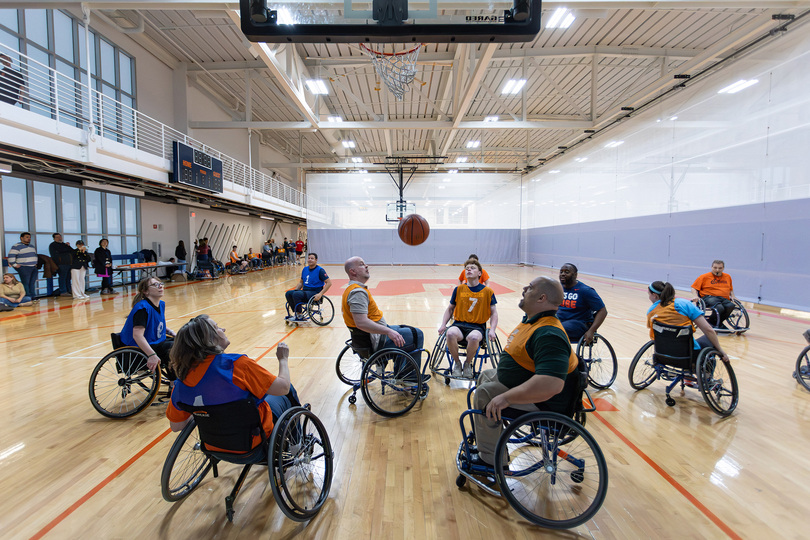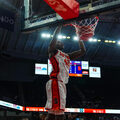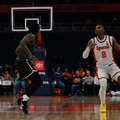OrangeAbility educates students on disability with adaptive sports

Adaptive sporting events at Syracuse University, like wheelchair basketball, sled hockey and wheelchair lacrosse, are organized in collaboration between the Disability Cultural Center and CNY Adaptive Sports. Students and faculty alike can participate in the events alongside players with disabilities. Joe Zhao | Design Editor
Get the latest Syracuse news delivered right to your inbox.
Subscribe to our newsletter here.
Wheels squeak against the hardwood court. People shout and cheer from the sidelines. Players trade pinnies as they unstrap themselves from wheelchairs, drenched in sweat. The competition and energy in the game of wheelchair rugby is palpable.
“It was really tough, but honestly very very fun,” sophomore club rugby player Michael Canina said. “My shoulders hurt real bad. It was different, but in a good way.”
The wheelchair rugby game was part of Syracuse University’s annual OrangeAbility programming for Disability Pride Month, celebrated by SU in April instead of the national month of July. Organized in collaboration between the Disability Cultural Center and CNY Adaptive Sports, the events allow students and faculty without disabilities to participate in adaptive sports alongside players with disabilities.
OrangeAbility began in 2012 as an initiative by the Disability Student Union. This year, along with wheelchair rugby, events include wheelchair basketball, sled hockey and wheelchair lacrosse.
Sports are a powerful tool to normalize and highlight disability, said Peyton Sefick, member of CNY Adaptive Sports’ Board of Directors. Adaptive sports harness the university’s strong sports culture to make engaging with disability more accessible and fun for students, he said. Once they play in a wheelchair or sled, their understanding of disability changes.
“Sports are a pretty cool equalizer for people,” Sefick said. “Instead of seeing it as something that someone with a disability can do, they can actually try it and feel like ‘Wait, hold on a second. This feels like basketball, but it’s different and it’s fun and I like it.’”
Newhouse School of Public Communications Professor Seth Gitner facilitated the connection between SU and CNY Adaptive Sports for these events. Gitner is on the organization’s Board of Directors and plays for The Central New York Flyers sled hockey team, which he found after a neck injury in 2017.
Gitner has long involved students in adaptive sports, working with students to rebrand CNY Adaptive Sports from Move Along, and bringing his students to play sled hockey during class. Students’ active involvement in adaptive sports gives them an expanded understanding of disability, he said.

Adaptive sports challenge participants to compete in different ways. Syracuse University students’ active involvement in adaptive sports gives them an expanded understanding of disability. Joe Zhao | Design Editor
The Disability Cultural Center worked with student and faculty groups to reach a broader swath of the campus community. Gitner, who is also the advisor for the SU men’s club ice hockey team, organized the Inclusive Cup sled hockey tournament at Tennity Ice Skating Pavilion on April 13. The event saw dramatic growth in its second year, with over 40 participants. The tournament raised money for CNY Adaptive Sports.
Members of the hockey team played with CNY Adaptive Sports athletes. The game, new to some of its players, challenged them, Gitner said.
“It’s a hard game,” he said. “They realize that they’re really good at hockey, but when you put them in sleds, it’s a different experience.”
Faculty participated in OrangeAbility, too. Eleven Newhouse faculty, including Dean Mark Lodato, played in a wheelchair basketball tournament alongside students and other community members on April 15.
Gitner said it was “exhilarating” to play alongside his Newhouse colleagues. He appreciated the game’s adaptive nature, as he wouldn’t have been able to play without the wheelchairs. Playing together gave him the opportunity to interact with new colleagues and strengthen existing relationships.
Earlier in the month, 12 Panhellenic Council sororities participated in a wheelchair basketball tournament, with a CNY Adaptive Sports player-coach for each team. Chloe Fiddle, who played for the Alpha Epsilon Phi sorority team, said she gained a better understanding of people in wheelchairs’ experiences. She learned from the CNY Adaptive Sports athletes on her team, as she adjusted to the new strategies for dribbling and getting across the court.
Delta Delta Delta sorority won the tournament. Disability Cultural Center Director Carrie Ingersoll-Wood said she noticed Tri Delta’s camaraderie and team-building, which was the event’s goal.

For many students, adaptive sports are their first interaction with the Disability Cultural Center. Competitive sports has been an easy way to reach more participants and increase the office’s representation on campus. Joe Zhao | Design Editor
For many students, these events are their first interaction with the Disability Cultural Center, Ingersoll-Wood said. Competitive sports has been an easy way to reach more participants and increase the office’s representation on campus.
“If we’re one thing here at Syracuse University, we’re heavy into sports,” Ingersoll-Wood said. “We’re very competitive and students love to play a game. It’s a great way for students to learn about disability culture.”
Beyond students’ one time participating in OrangeAbility’s events, Ingersoll-Wood said she hopes playing adaptive sports “rounds them out.” She hopes students will think more about inclusion and sports in their future lives.
“By hosting these types of events, we’re building global citizens in their awareness of the culture of sports, so that they turn to it, not just in the experience they had on SU’s campus, but they look for it in other places,” Ingersoll-Wood said.

Cole Ross | Digital Design Director
However, Gitner said these events alone are not enough. He hopes more students will get involved in the future, prioritizing action and giving back to their community, and Sefick hopes the school will implement adaptive club sports teams.
SU students learning adaptive sports are physically taxing and demanding is just the first step in awareness.
“They discovered that these sports are really difficult and hard,” Ingersoll-Wood said. “We’re challenging them as athletes to perform in ways that they hadn’t really thought about.”






